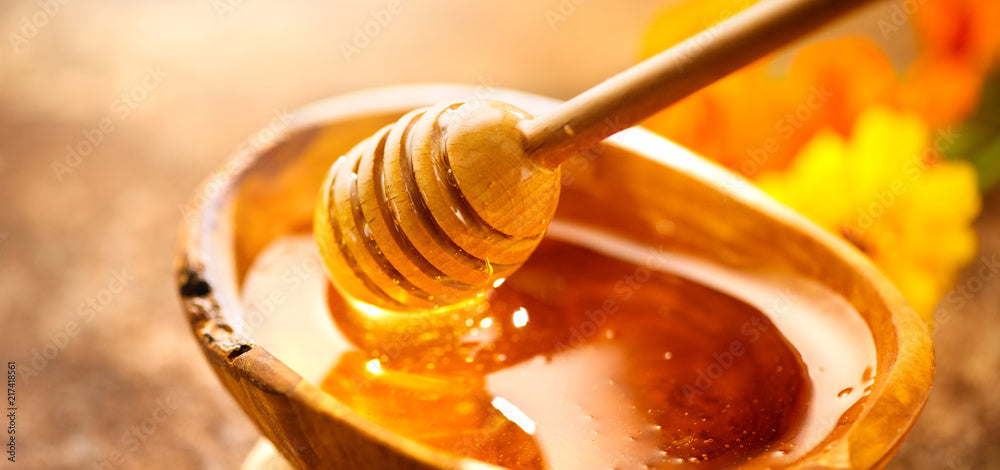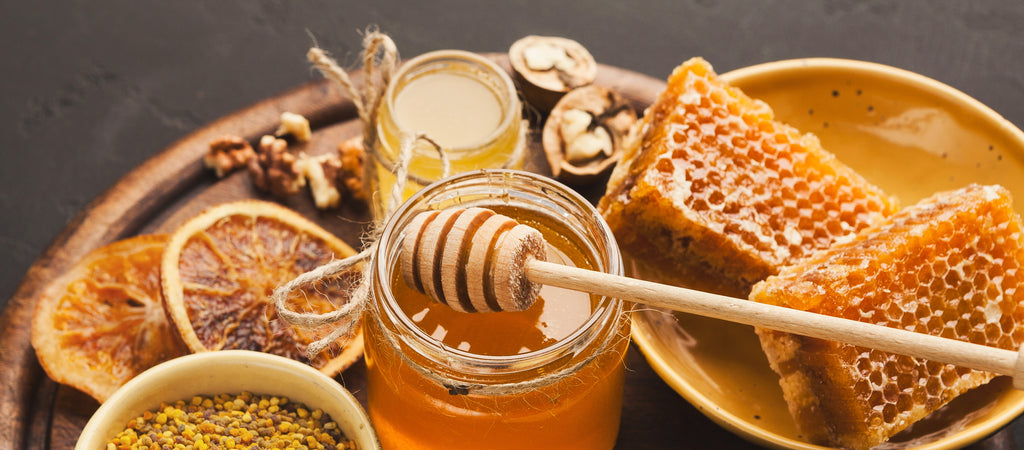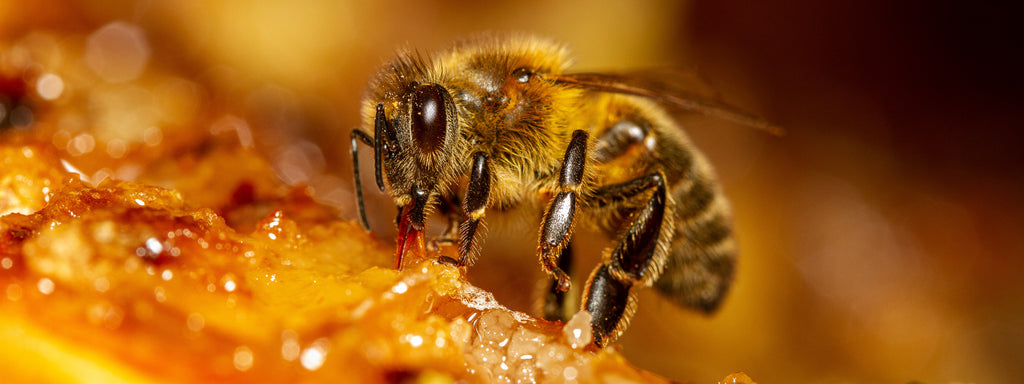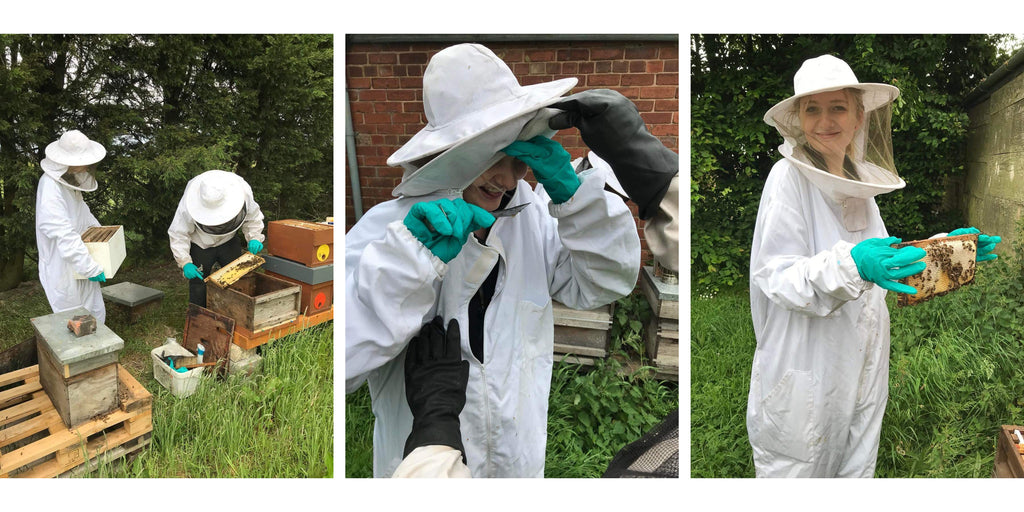The Benefits of Honey in Skincare: Beyond the Surface

There are few skincare ingredients that match the true healing powers that honey seems to capture. Food of the bee, created for their consumption and yet it sits at the very heart of human health, cuisine and beauty.
In fact, you’d struggle to find a single household across the UK that doesn’t have a rogue jar of this golden liquid stored away in their cupboards, just waiting to be spread on toast or spooned into a mug of hot lemon water to soothe a sore throat or aching chest. This is the case for a single reason: this one simple, sumptuous creation is transformative.
Not only that, but honey is about as natural as an ingredient can be. No need for complex manufacturing or the addition of colourants, additives or preservatives; the honeybees made a miracle of nature that is a simple success, just as it is.
Because Bee Clean Soaps harness the power of honey in every skincare product we create, we thought we’d celebrate its wonder with this guide on how honey has shaped the beauty industry for thousands of years.
So let’s get started.

The history of honey in beauty
Before we take a deep dive into the endless benefits of honey for skin, let’s take a little look at the vast history it has amassed in our beauty routines:
The Egyptians
Some of the earliest records of raw honey being used as a vanity ingredient originate in ancient Egypt. Cleopatra was famously known for taking long milk and honey baths to keep her skin looking radiant and youthful.
Could this be the reason that she is renowned for being one of the most beautiful women in our history books? Her power and legendary iron fist were certainly not accredited to this tradition, however this might have been the origin of the link between silky smooth skin and honey. Because the Tudors and ancient Greeks soon caught on.
Not only this, but honey was considered highly sacred to the Egyptians, with the belief that the Sun God, Ra, created the honeybees from his tears. It was therefore deemed that their healing powers were a gift granted for sacred use, and the honey they created was used for a wide range of medicinal and skincare purposes - for a high price, of course.
The Greeks
In the era of Helen of Troy, women wearing little makeup was the beauty standard of the day. Instead, they preferred to keep their skin looking clear and youthful by applying honey and olive oil - a natural remedy that can still be seen in many skincare products, including our very own natural soap bar range.
Before complex cosmetics and synthetic ingredients were added to our cleansing routine, honey and olive oil kept skin clear for centuries.
Did you know that it was fashionable for Greek women to combine plants and fruit to lead-based dyes and mercury to colour their cheeks and lips. So whilst their skincare routine might have seemed healthy, their makeup routine certainly wasn’t.
Of course, we definitely don’t endorse this practice today.
The Tudors
Although the majority of skincare ‘miracle cures’ that appeared during Queen Elizabeth I’s reign were pretty dangerous and counterproductive, there is one we can get behind: applying honey, lemon juice and rosewater to the skin.
Raw honey is a natural humectant and has antibacterial properties, so it’s no wonder it was used as a remedy for acne throughout various stages of history. Although we now know far more about the cause of acne and it’s unlikely that honey would have been 100% effective, it may have soothed the irritation and reduced the chances of infection.
The Romans
The Romans imported vast amounts of honey from all over their Empire to use for medicinal, cosmetic and culinary purposes. In fact, certain excavations have found clay beehives built by the Romans, although it’s believed the Egyptians were the first to domesticate honeybees.
The Romans used raw honey extensively to treat skin conditions from simple rashes to ulcers and large open wounds. Again, this is not a practice we recommend today, but it does show just how important honey has always been in skin care across the globe.
What is raw honey?
You may have noticed our use of the phrase ‘raw honey’ and wondered what this means exactly.
Raw honey is honey as bees make it. It is honey that has been retrieved from a beehive and strained through a nylon cloth to remove any lingering impurities.
‘Regular’ honey is processed differently. After straining, it is pasteurised and filtered further to remove the yeast and air bubbles. Some manufacturers will also alter the honey by adding additional sugar and sweeteners to bring the cost down.
This new golden liquid might look more appealing on supermarket shelves, but it is actually of lesser quality because it removes nutrients like pollen and antioxidants, and reduces its lifespan.
This is why many skincare enthusiasts consider it bad practice to process honey after it has been strained. Why get rid of the syrupy, medicinal goodness?
At Bee Clean Soaps, we only use raw honey in our natural soap bars. We source it from a local beekeeper who lives just around the corner so we know exactly what we put in your soaps - and now you do too.

Is raw honey good for your skin?
The short answer is yes. Honey is amazing for your skin for a myriad of reasons. We wouldn’t put it in all of our natural soap bars if it wasn’t.
In fact, honey is one of the key factors in causing our soap to be so soft and silky in texture, as well as manifesting its syrupy goodness for the good of skin health.
So let’s take a look at exactly why honey is our favourite skincare ingredient of all.
But first, a quick word from the passion behind our business:
‘My Grandma and Grandad understood the virtues of honey and spread their love for it to me. Then I started my journey of learning about natural ingredients for skin and along the way, I learned that natural sugars such as honey are complex and healthy ones.
Honey is great for your skin. Of course, raw honey is the best because it is straight from nature.’
- Wendy, Chief Soapmaker
The benefits of raw honey in skincare
- Moisturising
Raw honey is a natural humectant, which means it naturally hydrates and softens, without the need for any extras. Its structure allows it to seep easily into the skin rather than sit on its surface, leading to long-term, deeply moisturising results.
- Gentle on skin
If you have sensitive skin, then you’ll be well aware of how irritating exfoliating tools, ingredients and synthetics can be. The enzymes in honey exfoliate skin without the torment, making it the perfect solution for gently cleaning skin.
That’s why we use it as the predominant ingredient in our certified baby safe soap bars:
See - honey is so gentle that it is ideal for gently exfoliating the skin of your little one, keeping newborn skin soft, supple and intact without irritating it.
- Anti-inflammatory
Honey has anti-inflammatory properties that soothe redness and kill bacteria on your skin - it is a truly healing miracle of nature.
Honey is also high in vitamins, minerals, proteins and amino acids which contribute to its remedial abilities.
- Antibacterial
Honeybees remove the moisture from honey to stop bacteria and parasites from growing on it in the hive! This makes it antibacterial on human skin too.
Did you know that soap bars themselves don’t kill bacteria? Instead, the chemical - lye - loosens the dirt and grime to make it easier for water to rinse it away. Honey simply gives it that extra oomph of antibacterial magic.
- Natural
Raw honey is as natural an ingredient as they come, only altered by filtering out honeycomb and large chunks of pollen.
Natural ingredients have the power of keeping skin healthy, safe and soft without any synthetic ingredients, additives or other human-made substances. This also gives it the added bonus of being eco-friendly, sustainable and avoids polluting the water.
Natural ingredients are kind to our skin and to the planet. For wildlife’s sake, choosing natural wins every time.
- Kind to bees
Whilst honey might not be suitable for vegan consumption, its production is ethical if you source it from the right places.
As we know, mass produced animal products cannot be sustainably and ethically sourced due to the manner with which animals are exploited in the process. However, small, artisan businesses are the staple of eco-friendly production, and have the luxury of finding honey from independent beekeepers who would never harm the wonderful creatures that produce our honey.
If a beekeeper takes too much honey, then the bees won’t have a sufficient store to last them through the winter, which is why it is vitally important to only take a small amount from their store.
By giving bees a safe place to live and work, we are also able to protect their colonies and allow them to continue pollinating the world, as one of the most important creatures to exist globally.
Bee Clean Soaps are committed to protecting bees of all shapes and sizes, which is why we donate 10% of our profits to Bumblebee Conservation Trust.

Is honey good for eczema?
Honey is naturally anti-inflammatory and gentle at the same time. Its enzymes and the vitamins it contains make it great for soothing eczema and psoriasis prone skin.
However, always be aware that honey is healing, but it’s not medicine. If you’re breaking out in unexplained eczema, or experience chronic problems with broken skin that’s causing irritation, please do consult a doctor before attempting to cure it yourself.
It is well documented that the chemicals in soap can irritate eczema prone skin, so we would recommend using our Unscented Lotion Bar to soothe the irritation, rather than using soap that is safe for sensitive skin. This contains beeswax rather than honey, and is 100% natural, free from additives and chemicals, and made from a simple combination of organic, unrefined shea butter, Yorkshire Rapeseed Oil and beeswax.
Is taking honey bad for bees?
Not the way we do it!
Taking honey from bees is not harmful to them in the slightest, if it is done with care.
At Bee Clean Soaps, we are committed to supporting local beekeepers who protect their colonies and believe strongly in the ethics of what we do. All of our honey is sourced from just around the corner - some of our team have even taken part in the beekeeping process itself to learn more - which means we know exactly where our honey is coming from, and how the bees are being treated.

